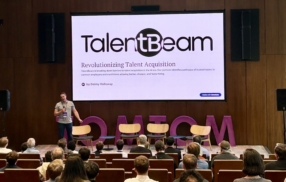
Electric Vehicles Hit Some Recent Potholes. Here’s a Roadmap to the Way Ahead
By McGregor McCance
Apple Inc.’s recent decision to abandon development of an electric vehicle was seen by some as a red flag for the EV industry, which had been experiencing rapid growth. The Apple news wasn’t the only concerning development.
Industry leader Tesla cut prices on slowing demand for its vehicles. Others, such as electric-truck manufacturer Rivian Automotive and legacy automotive giants Ford and Volkswagen, are experiencing slowdowns or paring EV production, too. Meanwhile, Toyota is enjoying increased demand for its hybrid vehicles, seeming to reap the rewards of going against the all-electric grain by focusing on vehicles powered by a combination of internal-combustion engines and batteries.
What does it all mean for the EV industry? For analysis of recent trends and some longer-term perspective, we checked in with Michael Lenox, Darden professor and co-author of “

Professor Mike Lenox teaches the core MBA strategy course at Darden and an MBA elective on Strategy in the Digital Age.
Q: The transition to electric vehicles seems to have slowed in recent months, or at least taken a few hits. Is that a fair reading?
While there has been quite a bit written lately about a slowdown in EV sales, I think the articles are missing a critical point – auto sales are down across the board due in part to high interest rates. The better question is what percent of new vehicle sales are electric? On this metric, the market share of EVs continues to expand. We saw a near doubling of this metric, year over year, for the past five years to the point now that globally 20% of all new car sales are electric. The number is close to 40% in China. The US lags, but is around 14% of new car sales.
Interest rates are affecting car sales of all kinds. But what effect does the sales price of an EV have on continued growth of the industry?
The big question is whether car manufacturers can make lower-tiered vehicles at a price point that is attractive to customers and allows them to secure profit margins. The highly publicized pullbacks on EVs by Ford and GM reflect the challenges they have faced in producing such vehicles. My question is whether this a condemnation of electric vehicles or a condemnation of Ford and GM? The cost of batteries – the main expense in EVs – has come down dramatically over the past decade. BYD in China is the largest EV producer in the world. They are making inexpensive EVs that appear to be profitable for BYD. They are expanding sales to the European Union and, perhaps eventually, the US. When we have technology disruptions, such as the electrification of vehicles, it is often the case the incumbent firms struggle with the transition (see Ford and GM) and we see the rise of entrepreneurial ventures (see Tesla and BYD). There is a reason we are not all streaming videos from Blockbuster.
Toyota didn’t overcommit to all-electric production, and now is seeing its strategy on hybrids rewarded. How does this fit into the EV industry’s long-term trends?
I believe hybrids remain a transitory technology at best. Hybrids are seeing a resurgence in part because of the growth in EVs and lingering consumer range anxiety. For a customer who wants to go electric but fears being unable to charge their vehicle when traveling, a hybrid seems to make perfect sense. The challenge is that there is no bending of the cost curve where hybrids will be lower cost to manufacture than either internal combustion engines or electric vehicles for the simple reason that they have both systems. The promise of EVs is that they are simple machines – basically a battery stack and a couple electric motors. They don’t have transmissions, fuel injectors, coolant systems, and exhaust systems. As the price of batteries come down, EVs will be the cheaper option, potentially significantly so.
As for range anxiety, I believe it is largely misplaced and increasingly less an issue. In the US and EU, the market is quickly building out charging infrastructure to meet the growing demand of EVs. The Sheetz and Wawas of the world are quickly building charging stations. Tesla has built out a supercharger network that covers much of the US. Their charging standard has now been adopted by the likes of Ford and GM and will soon be opening up to all automakers.
What still needs to happen to enable a more rapid transition to consumer acceptance and manufacturer embrace of EVs?
I think we will see increased acceptance as more consumers are exposed to EVs. I would focus on the rate of change. In even the most resistant communities, we are seeing significant growth in adoption rates. As more and more of your friends and neighbors adopt EVs, range anxiety will get less pronounced. Charging infrastructure will be developed to meet demand. And, of course, the prices for EVs will likely continue to come down.
As for manufacturers, some of the hesitancy we see among incumbent automakers is that they continue to sell a healthy number of internal combustion engines. Why make the switch? This is classic behavior in the face of disruption. Kodak clung to their faith in, and financial dependence on, selling film. Blockbuster, the same, in DVD rentals. I predict a significant shakeout in global automakers. We are going to see the continued rise of a handful of entrepreneurial pure plays, like Tesla and BYD, and the likely failure and mergers of legacy automakers. We will also likely see the entry and failure of innumerable start-ups in the EV space. Again, this is be expected and follows the common pattern with new technologies. The failure of EV start-ups and legacy automakers alike should be expected and read as a maturation of the transition.
What does the future look like? Do you still think there will be more sales of EVs than gas-powered vehicles within the next 10 or 20 years?
Predicting technology transitions is a fool’s errand. There will likely be many twists and turns in the journey to EVs. With that said, I feel confident that we are in the midst of a transition, and I think it will play out faster than many people realize. When the dynamics of change start unfolding, people are often surprised at the pace.
My guess is that by the end of this decade, the preponderance of new vehicle sales will be electric. Of course, the full transition to EVs on the road will take another decade – the average lifespan of a car is roughly 10 years. Given the pressures to decarbonize to help address global climate change, I do think policy can play a role in accelerating a transition. Tax subsidies for EV purchasers certainly have helped increase the demand for vehicles. We may want to consider incentives to encourage owners to retire old gas-power vehicles early and replace with EVs. With respect to climate change, time is of the essence.
The University of Virginia Darden School of Business prepares responsible global leaders through unparalleled transformational learning experiences. Darden’s graduate degree programs (MBA, MSBA and Ph.D.) and Executive Education & Lifelong Learning programs offered by the Darden School Foundation set the stage for a lifetime of career advancement and impact. Darden’s top-ranked faculty, renowned for teaching excellence, inspires and shapes modern business leadership worldwide through research, thought leadership and business publishing. Darden has Grounds in Charlottesville, Virginia, and the Washington, D.C., area and a global community that includes 18,000 alumni in 90 countries. Darden was established in 1955 at the University of Virginia, a top public university founded by Thomas Jefferson in 1819 in Charlottesville, Virginia.
Press Contact
Molly Mitchell
Senior Associate Director, Editorial and Media Relations
Darden School of Business
University of Virginia
MitchellM@darden.virginia.edu




